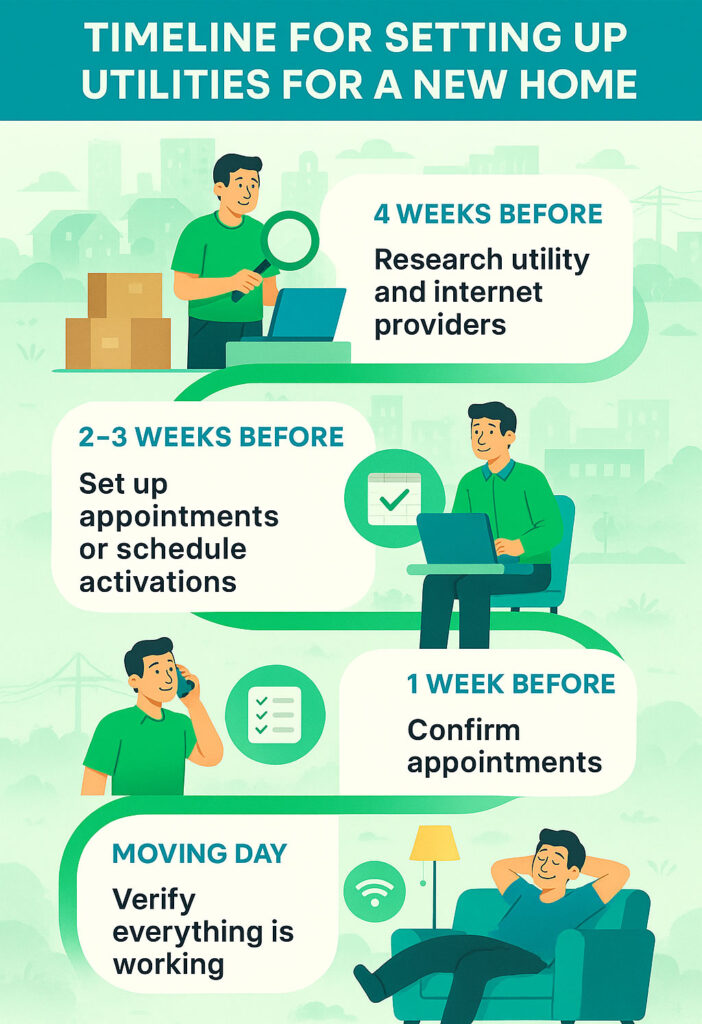Key Takeaways
- Give yourself at least 4 weeks before moving to research and schedule utility setups to avoid last-minute stress.
- Have your new address, ID, move-in date, and payment info ready to make setup a breeze.
- Shop around for internet, TV, and, in deregulated areas, energy providers to find the best deal for your needs.
- Schedule disconnections, take final meter readings, and share your forwarding address to close things out smoothly.
Moving into a new home is an exciting new chapter filled with possibilities. Setting up utilities when moving to a new address can be a daunting task, amidst the chaos of packing and organizing your belongings. Whether you’re transitioning to a new apartment or settling into a new house, ensuring your utilities are set-up before departing your current residence is crucial. This step-by-step guide is designed to simplify the process and help you move into your new place smoothly and stress-free.
- Calculate Your Moving Costs
- Compare Moving Companies
- Get Multiple Quotes
- Move with Confidence
Timeline: When Should You Start?

Planning ahead is key to a stress-free move, especially when it comes to utilities and internet services. Starting early allows you plenty of time to research providers, schedule appointments, and address any unexpected issues without pressure.
To avoid any disruptions, start planning at least 4 weeks before your moving date:
- 4 weeks before: Research utility and internet providers at your new address and start making a plan.
- 2-3 weeks before: Begin cancelling utilities at your current home. Set up appointments or schedule activations for utilities and internet.
- 1 week before: Confirm appointments and double-check scheduled activations.
- Moving day: Verify that everything is activated and functional.
Finding Providers in Your Area
Knowing your options helps you make informed decisions. While some utilities might be provided through your city, others, like internet, electricity, and even natural gas, can offer you a choice, especially in deregulated markets.
Electric and Natural Gas
In most areas of the country you only have one or maybe two choices when it comes to electricity or gas. However, in deregulated areas, you have the flexibility to choose your electricity or natural gas supplier, potentially saving you money. This choice encourages competition, often leading to lower rates and better service quality. Take the time to compare multiple providers carefully.
- Research providers: Compare rates, contract lengths, renewable energy options, and customer satisfaction reviews.
- Understand contracts: Look out for introductory rates, fixed vs. variable pricing, cancellation fees, and hidden charges.
- Check state resources: Many states offer comparison websites to simplify your choice or search your zip to find all utility providers for your new home.
Committing to a contract can be daunting, as life’s circumstances are unpredictable. What if you need to move before your contract term ends? Is it possible to terminate your deregulated energy contract?
The answer is generally yes. In states with deregulated energy markets, provisions exist for such situations. If you’re moving within the same region covered by your utility company, transferring your service to the new address typically incurs no penalty. However, if your relocation takes you beyond your current utility company’s service area, you may face an early termination fee (ETF) for canceling before your contract expires. The applicability of such fees depends on the laws of your state.
Water and Trash
Typically, water and trash services are managed by local municipalities or city authorities. Contacting these local services ensures you understand the billing process, schedules, and any required deposits. Contact your new city’s municipal offices or visit their website for details.
Internet and Cable
Reliable internet and cable providers are crucial for connectivity and entertainment in your new home. Availability and quality of service can vary greatly depending on your specific neighborhood, so thorough research is essential.
Internet service providers vary widely by area. Check online or ask neighbors for recommendations. Consider factors like:
- Connection type (fiber, cable, or 5G Home Internet)
- Connection speed
- Data caps
- Contract terms
- Customer support quality
Setting Up Utilities for Your New Home
Ensuring your utilities are ready to go when you move in allows you to focus on unpacking and settling in comfortably. Proactively coordinating with providers helps prevent unwanted delays and ensures essential services like water, power, and internet are available from day one.
- Contact providers early: Once chosen, set your start date ideally one or two days before you move in.
- Schedule installation: For internet or cable, arrange for installation appointments as early as possible to avoid delays.
- Verify activation: On your move-in day, ensure utilities are functional, and keep emergency contact numbers handy.
Being prepared makes the process smoother and quicker. Utility providers often require specific personal and account information to establish your services. Gathering these details beforehand saves time and reduces stress during calls or online setup.
Before reaching out to providers, have the following details handy:
- New address (including apartment/unit number if applicable)
- Move-in and move-out dates
- Your Social Security number (for credit checks)
- Identification (driver’s license, passport, state ID, or birth certificate)
- Payment information (for initial deposits or setup fees)
- Existing utility account numbers (if transferring service)
- Account information (if transferring existing services)
Prepping Your Old Home’s Utilities for Moving
Wrapping up utilities at your old home is just as important as setting them up at your new place. Properly disconnecting services and finalizing accounts helps you avoid surprise bills and disputes after you’ve moved.
- Schedule disconnections: Notify providers at least two weeks in advance, scheduling disconnection for the day after you leave.
- Provide forwarding address: This ensures you receive any final bills or refunds on deposits.
- Final meter readings: Take photos of meters on move-out day to prevent billing disputes.
- Return equipment: You may have been renting equipment like an internet modem or DVR box, make sure to return it before moving. Many providers have convenient drop-off locations and many even allow you to return the equipment by mail.
Helpful Tips to Ease Your Move
Moving is a perfect opportunity to review your utility and internet needs and find ways to save money. Bundling services, taking advantage of promotional offers, and automating payments can simplify your life and reduce your monthly expenses.
- Bundle services: Some providers offer discounts for bundling services like internet, cable, home security, and mobile phone.
- Ask about specials: Providers frequently offer promotions or discounts for new customers.
- Check for deposits: Utility providers might require a refundable deposit; clarify amounts and terms upfront.
- Automate payments: Setting up auto-pay helps avoid late fees and keeps your credit healthy.
FAQs About Setting Up Utilities
When should I start setting up utilities for my new home?
What documents do I need to set up new utility accounts?
How do I find out which utility providers service my new address?
What should I do with the utilities at my old home?
What if I’m moving to a deregulated energy market?
Do I need to be home when utilities are turned on?
Can I transfer my old utility accounts to my new address?
Will I need to pay a deposit for utilities?
How can I estimate my monthly utility costs?
Can I change providers after I move in?
What is a security deposit, and can I avoid it?
About the Author
David has been an integral part of some of the biggest utility sites on the internet, including InMyArea.com, HighSpeedInternet.com, BroadbandNow.com, and U.S. News. He brings over 15 years of experience writing about, compiling and analyzing utility data.

